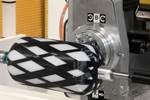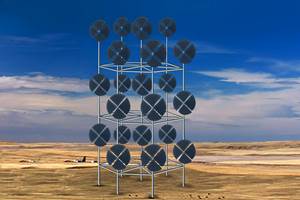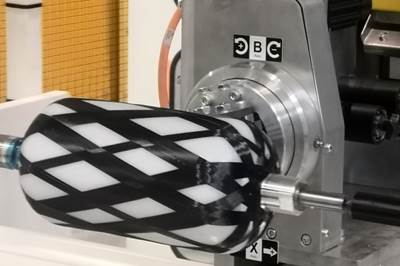Cygnet Texkimp supplies filament winding cell to TWI Materials Integrity Centre
Versatile composites equipment will support the global R&T organization’s research and manufacturing of novel materials and parts for pressure vessels and pipes.
Composites technology company Cygnet Texkimp (Cheshire, U.K.) has supplied a multi-mode filament winding cell to TWI’s Materials Integrity Centre in Middlesbrough, U.K. The technology will be used to develop, validate and commercialize new composite materials and parts, including high-performance pressure vessels and pipes for the aerospace, nuclear and hydrogen markets.
TWI is a membership-based global research and technology (R&T) organization offering R&D support and engineering, materials and joining technologies at 18 sites worldwide, delivered by more than 800 scientists, engineers, consultants and support staff. Its Materials Integrity Centre is a state-of-the-art laboratory and test facility part funded by the European Regional Development Fund to provide specialist materials and engineering support to businesses in the North East of England.
“A crucial feature of this versatile, multi-mode winding cell is the ease with which it can be modified and customized by TWI.”
“The new center combines the industrial expertise of TWI in the area of nonmetallics testing and evaluation with the academic excellence of Teesside University in net-zero technologies,” says Mihalis Kazilas, business group manager of TWI’s Materials Performance and Integrity Group. “Together, TWI and Teesside University will support local businesses and enterprises in the development of new products and services that will contribute to the growth objectives of the Tees Valley Social Economic Plan.”
The cell delivered by Cygnet Texkimp consists of a filament winding machine, driven fiber unwinding creel and pneumatic mandrel extraction technology. It is designed to run in a number of modes and can be modified to accommodate different resins and materials, with an adaptable wet-out system and wet winding capability to trial and optimize new resin formulations.
The machine can wind four tows simultaneously and each tow has its own tension control unit and dancer arm to regulate tension. This, coupled with a bespoke fiber handling and delivery system, enables accurate winding at higher tensions and speeds. The machine developed for TWI is currently capable of winding dry fibers and towpregs at tensions in excess of 100 newtons, but with simple modifications, and depending on the fiber being wound, can be engineered to produce much higher tension in the region of 200-300 newtons.
Gareth Davies, international sales manager at Cygnet Texkimp, explains how the machine’s engineering makes it ideal for TWI’s R&D program: “A crucial feature of this versatile, multi-mode winding cell is the ease with which it can be modified and customized by TWI, giving the organization and its partners a very flexible resource to carry out effective product development and optimization,” Davies explains. “As with all our machines, the way the fibers are handled and guided through the cell is critical to the quality and performance of the end product. Because this machine has been designed to look after the fibers throughout the process, TWI and its partners can achieve higher production speeds and fiber tensions, which in turn leads to lighter, thinner parts.”
Amir Khamsehnezhad, section manager at TWI’s Polymers & Composite Services Section, adds that the filament winder, in addition to helping TWI deliver research and manufacturing projects on composite pipes and tanks, is already playing a role as part of a bid for the European Space Agency (ESA) to develop SMART manufacturing technology.
Related Content
Honda begins production of 2025 CR-V e:FCEV with Type 4 hydrogen tanks in U.S.
Model includes new technologies produced at Performance Manufacturing Center (PMC) in Marysville, Ohio, which is part of Honda hydrogen business strategy that includes Class 8 trucks.
Read MoreComposites end markets: Automotive (2024)
Recent trends in automotive composites include new materials and developments for battery electric vehicles, hydrogen fuel cell technologies, and recycled and bio-based materials.
Read MoreDrag-based wind turbine design for higher energy capture
Claiming significantly higher power generation capacity than traditional blades, Xenecore aims to scale up its current monocoque, fan-shaped wind blades, made via compression molded carbon fiber/epoxy with I-beam ribs and microsphere structural foam.
Read MoreECOHYDRO project to enable recyclable composites for hydrogen storage
With the involvement of two schools from the Institut Mines-Télécom, the 4-year project aims to improve the intrinsic properties of a composite material based on Elium via four concrete demonstrators.
Read MoreRead Next
Filament winding increases access to high-performance composite prostheses
Steptics industrializes production of CFRP prostheses, enabling hundreds of parts/day and 50% lower cost.
Read MoreNCC commissions Cygnet Texkimp filament winder for hydrogen development
Multifunctional four-axis winding system offering fiber flexibility will underpin the NCC’s work in testing and manufacturing pressure vessels leading to commercial production.
Read More“Structured air” TPS safeguards composite structures
Powered by an 85% air/15% pure polyimide aerogel, Blueshift’s novel material system protects structures during transient thermal events from -200°C to beyond 2400°C for rockets, battery boxes and more.
Read More

























